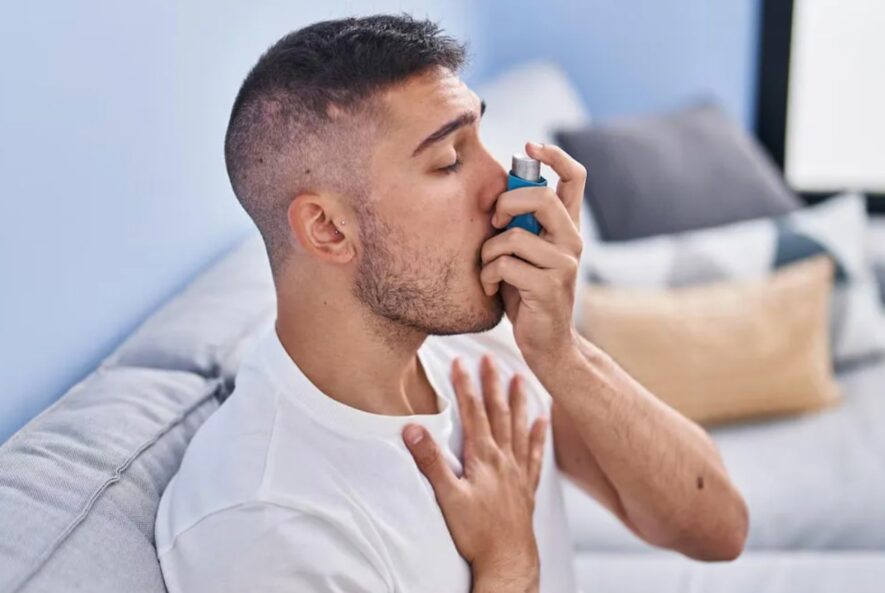
Asthma is a chronic respiratory condition that affects millions of people worldwide. While it can occur year-round, seasonal changes often trigger asthma attacks, making it more challenging for patients to breathe freely. Sudden shifts in temperature, pollen exposure, humidity, and pollution levels can all worsen asthma symptoms, leading to coughing, wheezing, chest tightness, and shortness of breath.
For asthma patients, prevention is always better than cure. With proper planning, awareness, and medical guidance, it’s possible to minimize the impact of seasonal triggers and maintain healthy lung function throughout the year.
In this guide, we’ll cover:
-
Common seasonal asthma triggers
-
Tips and strategies to prevent asthma attacks
-
The role of medical care in managing seasonal asthma
-
Expert advice from Dr. Shivanshu Raj Goyal, Best Pulmonologist in Gurgaon
-
FAQs to help patients understand and manage their condition
Understanding Seasonal Asthma
Seasonal asthma occurs when environmental changes trigger asthma symptoms. Common seasonal triggers include:
1. Pollen
-
Trees, grass, and weed pollen can cause allergic reactions in sensitive individuals.
-
Pollen counts are typically higher in spring and early summer, leading to increased asthma attacks.
2. Cold Weather
-
Cold air can irritate the airways and trigger bronchospasms.
-
Many patients experience coughing and shortness of breath in winter months.
3. Humidity and Rain
-
High humidity or sudden rain can increase mold and dust mite growth, which are common asthma triggers.
-
Damp conditions can worsen respiratory infections, making asthma management difficult.
4. Air Pollution
-
Urban areas, especially Gurgaon, have high levels of air pollution, including smog, vehicle emissions, and dust.
-
Polluted air irritates the lungs, exacerbating asthma symptoms, especially during seasonal transitions.
5. Viral Infections
-
Cold and flu viruses circulate more during seasonal changes, further aggravating asthma in vulnerable individuals.
Symptoms of Seasonal Asthma
If you have asthma, you may notice:
-
Persistent coughing, especially at night or early morning
-
Wheezing or whistling sound while breathing
-
Shortness of breath during physical activity
-
Chest tightness or pressure
-
Increased fatigue due to poor oxygen intake
Preventive Measures to Manage Seasonal Asthma
Prevention is key to managing seasonal asthma effectively. Here’s what you can do:
1. Monitor Air Quality and Pollen Levels
-
Track daily pollen counts and pollution levels in your city.
-
Limit outdoor activities on high-pollen or high-pollution days.
-
Consider wearing masks during outdoor activities when air quality is poor.
2. Maintain Clean Indoor Air
-
Use HEPA air purifiers to reduce allergens indoors.
-
Keep windows closed during high pollen seasons.
-
Regularly clean air-conditioning filters and vacuum floors using a HEPA filter vacuum.
3. Avoid Known Triggers
-
Identify personal asthma triggers through a diary or allergy tests.
-
Common triggers include dust, mold, pet dander, strong fragrances, and smoke.
-
Minimize exposure to these triggers to reduce the risk of attacks.
4. Medication Management
-
Always follow your asthma action plan prescribed by your pulmonologist.
-
Preventive medications such as inhaled corticosteroids reduce inflammation.
-
Keep a rescue inhaler handy for sudden flare-ups.
-
Regularly review medication dosages with your doctor, especially before seasonal changes.
5. Lifestyle Measures
-
Maintain a healthy diet rich in antioxidants to support lung health.
-
Stay hydrated to keep airways moist and reduce irritation.
-
Regular exercise improves lung function but avoid outdoor workouts on high-pollen or polluted days.
-
Practice breathing exercises like diaphragmatic breathing or yoga to strengthen lungs.
Role of a Pulmonologist in Seasonal Asthma Management
While lifestyle changes and preventive measures help, professional medical care is crucial. A pulmonologist can:
-
Assess the severity of your asthma and identify triggers
-
Conduct lung function tests to monitor airway health
-
Adjust medications and inhalers based on seasonal needs
-
Provide guidance on allergy management and immunotherapy if necessary
In Gurgaon, patients trust Dr. Shivanshu Raj Goyal, one of the best pulmonologists in the city, for expert evaluation, personalized treatment plans, and advanced asthma care. His expertise ensures that patients can breathe comfortably throughout seasonal changes without frequent flare-ups.
FAQs on Seasonal Asthma
1. What is seasonal asthma?
Seasonal asthma is when asthma symptoms are triggered by environmental changes like pollen, cold air, or humidity. It often worsens during spring, summer, or monsoon seasons.
2. How can I prevent seasonal asthma attacks?
Preventive measures include monitoring air quality, avoiding triggers, maintaining clean indoor air, following prescribed medications, and consulting a pulmonologist for personalized advice.
3. Can weather changes really trigger asthma?
Yes. Sudden shifts in temperature, humidity, or air pollution can irritate the airways, causing coughing, wheezing, and difficulty breathing.
4. Should I adjust my medication with the seasons?
It depends on your symptoms and asthma severity. Dr. Shivanshu Raj Goyal, Best Pulmonologist in Gurgaon, recommends reviewing your asthma action plan with your doctor before each seasonal change.
5. Are children more prone to seasonal asthma?
Yes. Children have more sensitive airways, making them more vulnerable to pollen, cold air, and pollution. Early intervention can prevent long-term respiratory issues.
6. Can lifestyle changes really make a difference?
Absolutely. Avoiding triggers, exercising, eating well, and practicing breathing techniques can significantly reduce seasonal asthma attacks.
7. When should I see a pulmonologist?
Seek medical attention if you experience frequent asthma attacks, worsening symptoms despite medication, or trouble breathing. Dr. Shivanshu Raj Goyal, a leading pulmonologist in Gurgaon, offers expert care for all asthma patients.
Conclusion
Seasonal asthma can disrupt daily life, sleep, and overall health if left unmanaged. However, with awareness, preventive measures, and expert care, it is possible to maintain healthy lung function throughout the year.
If you experience seasonal asthma symptoms in Gurgaon, don’t wait. Dr. Shivanshu Raj Goyal, Best Pulmonologist in Gurgaon, provides personalized asthma management, advanced diagnostic tests, and effective treatment strategies to help patients breathe freely and enjoy life without interruption.
Remember: Prevention is better than cure. Monitor triggers, stay prepared, and seek professional guidance to keep seasonal asthma under control.



